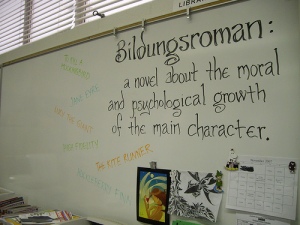“No road offers more mystery than that first one you mount from the town you were born to, the first time you mount it of your own volition, on a trip funded by your own coffee tin of wrinkled up dollars – bills you’ve scrounged and saved for … ” begins Mary Karr’s memoir Cherry.
It’s been said that there are only two stories in the world: a stranger comes to town and a man sets off on a journey. The German word bildungsroman, or “novel of formation,” is a version of the latter: a young person (traditionally a boy) undertakes an epic journey, during which he confronts inner and outer demons, and in the process becomes an adult. (When I think of this word I am reminded of the German poet Holderlin’s line in “The Journey”: “Reluctantly that which dwells near its origin departs.”) Think Tristram Shandy, The Adventures of Huckleberry Finn, Portrait of the Artist as a Young Man, The Catcher in the Rye.
In some ways, it seems to me, every story contains elements of the bildungsroman. A story must contain a moment of change, internal or external or both, often experienced as part of a (literal or metaphorical) journey. This change usually involves a ‘coming of age’: the central character is enlightened or disillusioned; if he doesn’t yet understand the enormity of his experience, the reader knows that soon enough he will.
